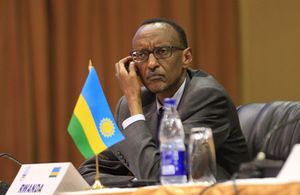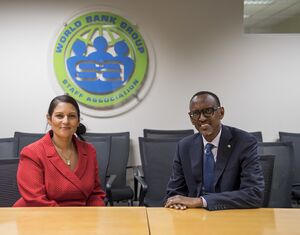Difference between revisions of "Paul Kagame"
(desc) |
(alma mater + mark as too shallow article) |
||
| Line 1: | Line 1: | ||
| − | {{person | + | <div style="border:2px solid #3333ff; background-color:#ccccff; padding:0.4em 0.5em; margin:auto; width:40%; text-align:center;"> |
| + | [[File:too shallow.png|left|72px]] | ||
| + | '''This page is lacking a [[deep political]] perspective'''.<br/>Please rework this to show the hand of the [[deep state]].</div>{{person | ||
|constitutes=politician | |constitutes=politician | ||
|wikipedia=https://en.wikipedia.org/wiki/Paul_Kagame | |wikipedia=https://en.wikipedia.org/wiki/Paul_Kagame | ||
| − | |description= | + | |description=Has been leader of Rwanda since he took power in 1994 |
|spouses=Jeannette Nyiramongi | |spouses=Jeannette Nyiramongi | ||
| − | |birth_date=1957 | + | |birth_date=23 October 1957 |
|birth_place=Tambwe, Ruanda-Urundi | |birth_place=Tambwe, Ruanda-Urundi | ||
|religion=Roman Catholicism | |religion=Roman Catholicism | ||
| Line 11: | Line 13: | ||
|victim_of= | |victim_of= | ||
|image=Paul Kagame.jpg | |image=Paul Kagame.jpg | ||
| + | |alma_mater=United States Army Command and General Staff College | ||
|sourcewatch=http://www.sourcewatch.org/index.php/Paul_Kagame | |sourcewatch=http://www.sourcewatch.org/index.php/Paul_Kagame | ||
|website=http://www.paulkagame.com | |website=http://www.paulkagame.com | ||
Latest revision as of 13:11, 5 December 2023
Please rework this to show the hand of the deep state.
(politician) | |
|---|---|
 | |
| Born | 23 October 1957 Tambwe, Ruanda-Urundi |
| Alma mater | United States Army Command and General Staff College |
| Religion | Roman Catholicism |
| Children | • Ivan Cyomoro • Ange • Ian Brian |
| Spouse | Jeannette Nyiramongi |
| Party | Rwandan Patriotic Front |
Paul Kagame is a Rwandan politician and former military leader. He is the sixth and current President of Rwanda, having taken office in 2000. Kagame previously commanded the Rwandan Patriotic Front (RPF), a Uganda-based rebel force which invaded Rwanda in 1990 and was one of the parties of the conflict during the Rwandan Civil War and the armed force which ended the Rwandan Genocide. He was considered Rwanda's de facto leader when he served as Vice President and Minister of Defence under President Pasteur Bizimungu from 1994 to 2000.
Contents
Background
Paul Kagame was born to a Tutsi family in southern Rwanda. When he was two years old, the Rwandan Revolution ended centuries of Tutsi political dominance; his family fled to Uganda, where he spent the rest of his childhood.
Ugandan army
In the 1980s, Kagame fought in Yoweri Museveni's rebel army, becoming a senior Ugandan army officer after Museveni's military victories carried him to the Ugandan presidency.
Rwandan Patriotic Front
Paul Kagame joined the RPF, taking control of the group when previous leader Fred Rwigyema died on the second day of the 1990 invasion. By 1993, the RPF controlled significant territory in Rwanda and a ceasefire was negotiated.
President Habyarimana
The assassination of Rwandan President Juvénal Habyarimana in April 1994 set off the genocide, in which Hutu extremists killed an estimated 500,000 to 800,000 Tutsi and moderate Hutu. Kagame resumed the civil war, and ended the genocide with a military victory.
In March 2007, lawyer Michael Hourigan blamed Paul Kagame for President Habyarimana's death.[1]
One-man show
In 2021 Justin Bahunga described Rwanda as a "one-man show of Paul Kagame."[2]
British exports
In April 2022, British Home Secretary Priti Patel concluded an agreement with President Kagame whereby asylum seekers in the UK would be exported to Rwanda.[3]
The UK will send asylum seekers who attempt to cross the English Channel to Rwanda for processing, after sealing a £120 million deal with the Rwandan government.
British Home Secretary Priti Patel will sign the agreement this afternoon during a visit to Rwanda’s capital, Kigali, following nine months of negotiations and several failed attempts to reach similar deals with other countries and offshore territories.
Asylum seekers judged by the Home Office to likely be economic migrants would be flown to the Commonwealth country and held in a facility until their application is processed, while the rest of the asylum seekers would stay in stricter, Greek-style centres in Britain until the Home Office makes a decision on their applications. The first of such centres is expected to open in Linton-on-Ouse, North Yorkshire.
Prime Minister Boris Johnson announced the deal in a speech Thursday in Kent, in which he argued Britain “cannot sustain a parallel immigration system” along with its post-Brexit points-based system because it creates unsustainable pressure for the UK taxpayer and is unfair to those applying to settle in Britain through “safe and legal routes.”
“From today, our new migration and economic partnership will mean that anyone arriving in the UK illegally as well as those who have arrived illegally since 1 January 2022 may now be relocated to Rwanda,” he said.
“This innovative approach, driven by our shared humanitarian impulse and made possible by Brexit freedoms, will provide safe and legal routes for asylum while disrupting the business model of the gangs because it means economic migrants taking advantage of the asylum system will not stay in the UK.”[4]
Events Participated in
| Event | Start | End | Location(s) | Description |
|---|---|---|---|---|
| Munich Security Conference/2017 | 17 February 2017 | 19 February 2017 | Germany Munich Bavaria | The 53rd Munich Security Conference |
| Munich Security Conference/2018 | 12 February 2018 | 14 February 2018 | Germany Munich Bavaria | The 54th Munich Security Conference |
| Munich Security Conference/2019 | 15 February 2019 | 17 February 2019 | Germany Munich Bavaria | The 55th Munich Security Conference, which included "A Spreading Plague" aimed at "identifying gaps and making recommendations to improve the global system for responding to deliberate, high consequence biological events." |
| Munich Security Conference/2022 | 18 February 2022 | 20 February 2022 | Germany Munich Bavaria | Slightly less than 1/3 of the 664 of the participants have pages here |
| WEF/Annual Meeting/2009 | 23 January 2009 | 27 January 2009 | World Economic Forum Switzerland | Chairman Klaus Schwab outlined five objectives driving the Forum’s efforts to shape the global agenda, including letting the banks that caused the 2008 economic crisis keep writing the rules, the climate change agenda, over-national government structures, taking control over businesses with the stakeholder agenda, and a "new charter for the global economic order". |
| WEF/Annual Meeting/2013 | 23 January 2013 | 27 January 2013 | World Economic Forum Switzerland | 2500 mostly unelected leaders met to discuss "leading through adversity" |
| WEF/Annual Meeting/2014 | 22 January 2014 | 25 January 2014 | World Economic Forum Switzerland | 2604 guests in Davos considered "Reshaping The World" |
| WEF/Annual Meeting/2015 | 21 January 2015 | 24 January 2015 | World Economic Forum Switzerland | Attended by a lot of people. This page lists only the 261 "Public Figures". |
| WEF/Annual Meeting/2016 | 20 January 2016 | 23 January 2016 | World Economic Forum Switzerland | Attended by over 2500 people, both leaders and followers, who were explained how the Fourth Industrial Revolution would changed everything, including being a "revolution of values". |
| WEF/Annual Meeting/2017 | 17 January 2017 | 20 January 2017 | World Economic Forum Switzerland | 2950 known participants, including prominently Bill Gates. "Offers a platform for the most effective and engaged leaders to achieve common goals for greater societal leadership." |
| WEF/Annual Meeting/2018 | 23 January 2018 | 26 January 2018 | Switzerland | ~2200 of the super-rich meet to talk about "Creating a Shared Future in a Fractured World" |
| WEF/Annual Meeting/2019 | 22 January 2019 | 25 January 2019 | World Economic Forum Switzerland | "The reality is that we are in a Cold War [against China] that threatens to turn into a hot one." |
| WEF/Annual Meeting/2023 | 16 January 2023 | 20 January 2023 | World Economic Forum Switzerland | The theme of the meeting was "Cooperation in a Fragmented World" |
Related Document
| Title | Type | Publication date | Author(s) | Description |
|---|---|---|---|---|
| File:Michael Hourigan Affidavit.pdf | affidavit | 8 March 2007 | Michael Hourigan | Michael Hourigan was appointed by the ICTR to investigate the shooting down of the aircraft of Rwandan President Juvenal Habyarimana which triggered the Rwanda Genocide. This is his sworn affidavit blaming General Paul Kagame who subsequently became Rwandan President. It was comprehensively ignored and suppressed by the ICTR. |

